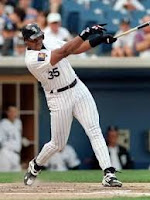The Hall of Fame induction ceremony is right around the corner, but what makes someone qualify as a first ballot Hall of Famer? Obviously the definition of greatness in baseball has changed over the years, but here are the most up-to-date criteria with which I judge baseball personalities on whether or not they're a first ballot Hall of Famer, whether the voters agree with me or not:
For contact hitters:
Criteria: .300+ career batting average
Why? Getting three hits in ten at-bats seems lackluster to most beginner baseball fans, but think to yourself about how you analyze a player's season, just based on batting average. Seeing a three in the tenths place is just a lot more attractive than a two.
Criteria: 3,000+ career hits
Why? Usually, Hall of Famers play around 20 years in baseball. If you average 150 hits a season over 20 years, you're Roberto Clemente (he finished his career with 3,000 hits on the dot). Who doesn't want to be Roberto Clemente? But seriously, usually the best contact hitters will have some 200+ hit seasons during their primes and then tail off a little bit at the end. That makes a round number like 3,000 so applicable. Recent Hall of Famer, Craig Biggio, had 3,060 hits for example.
For power hitters:
Criteria 500+ career home runs and/or 1,500+ career RBIs
Why? It's the same logic as with hits; a power hitter might have 30-homer, 100-RBI seasons during his prime, but then won't do as well later in his career. It's just a good number because it takes consistency into consideration while leaving room for bad seasons.
For the all-around hitters:
Criteria: 10+ career All Star Game appearances
Why? Ryne Sandberg, Pudge Rodriguez and Yogi Berra don't have career stats that jump out at you per se, but what they do have are a ton of All Star appearances. If a player is considered the greatest at his position in the league he plays in for ten or more years, then of course he deserves enshrinement in Cooperstown.
For pitchers:
Criteria: 250+ wins
Why? It used to be 300, but no pitcher has eclipsed that milestone since Randy Johnson did almost ten years ago. It's very rare that a pitcher even gets over 200 wins in a career, let alone 250, which makes the number extra special. Bert Blyleven, a Hall of Famer, had 287 wins. To put it into perspective, there are only 116 pitchers in baseball history to get over 200 career wins. Wow. Pitching is hard.
Why? It's a lot harder than it seems and it goes back to the batting average criteria, except the opposite; a two in the ones place looks better than a three.
Why? I call this the "John Smoltz Rule" because he was a reliever and a starter at different points in his career, only has 213 career wins, has an ERA of 3.33, made eight All Star Games, and is in the Hall of Fame. So if a starter or reliever could pull off John Smoltz-like stats that gets them at least eight appearances in the Summer Classic, they should be in the Hall.
Criteria: Win a lot.
Why? I'm grouping all of these positions together because they all are judged based on their team's success. Whether it be with one or multiple teams, if a head honcho leads his club to the promised land on multiple occasions, thus building at least a quasi-dynasty, then it's a done deal for me. See you in the Hall soon, Theo Epstein and Joe Maddon!










No comments:
Post a Comment
Note: Only a member of this blog may post a comment.